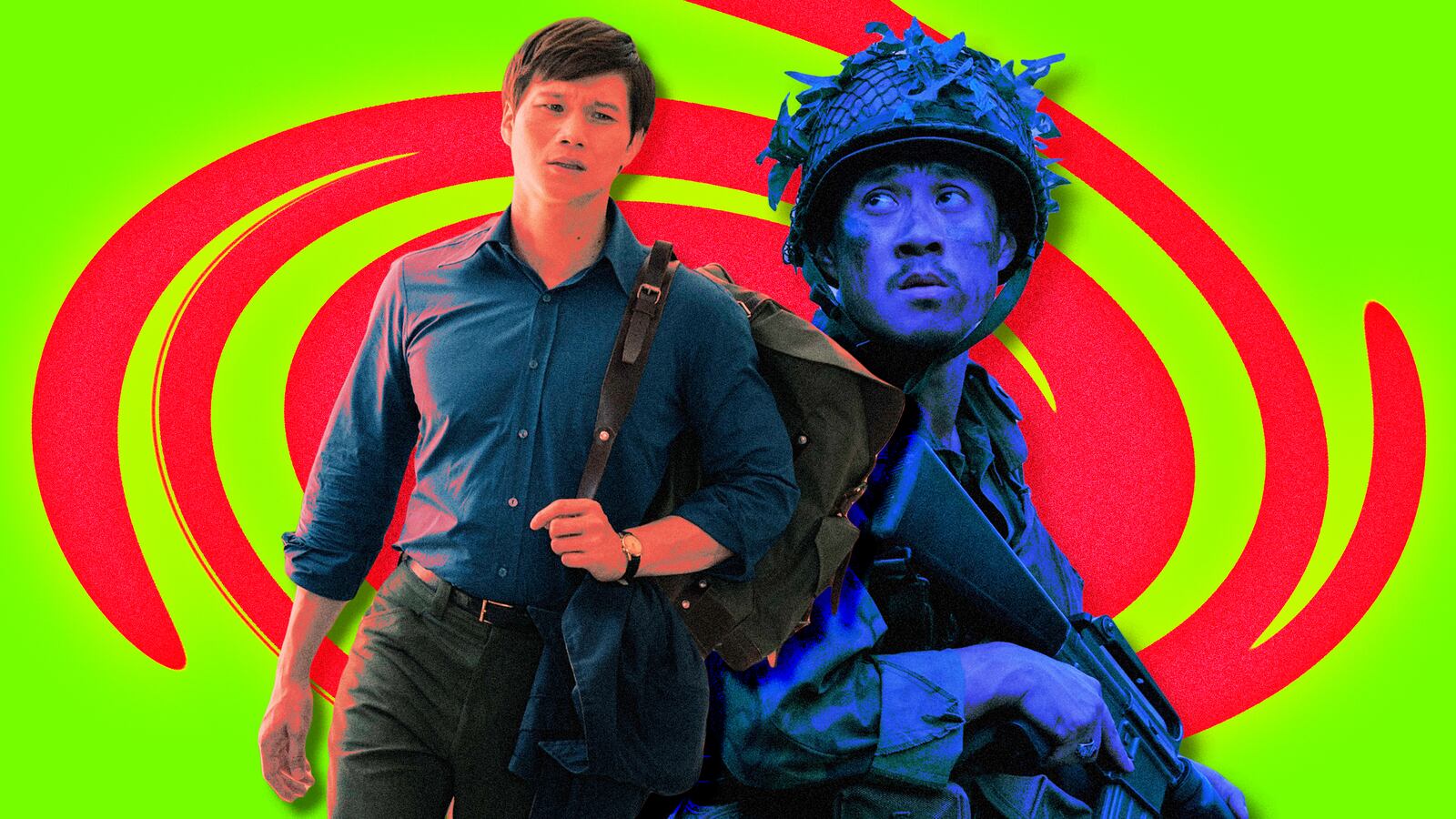Here we go: The main boys of The Sympathizer, Captain (Hoa Xuande) and Bon (Fred Ngyuen Khan) are on their way back to Vietnam to stage the second Vietnam War. Because, you know, everyone is looking for a sequel to that one. Huge hit around the world. Why not do it again?
Claude (Robert Downey Jr.) is on the ground in Thailand—their layover—and ready to welcome them back. “You boys have landed on the lips of your motherland,” he says, slapping Captain on the back. As if we needed more of this awkward sexual obsession with motherhood. The militia goes to party at some club in Thailand, which Captain accurately describes as “a farewell party on death row.”
Amidst the naked women, Claude asks Captain to speak with him in private. Claude has heard from the General (Toan Le) that Captain fears this mission will be unsafe. Well, Claude says, its safety depends on how classified this mission has managed to stay—it is a secret, is it not? Captain sweats. Then, Claude reveals Captain’s worst nightmare: The entire conversation at Sonny’s (Alan Trong) place, in which Captain revealed that he was a Communist spy, was recorded, showing his entire hand.
Because, duh, right? Sonny wrote that first article about the militia. Naturally, the CIA bugged his house not long after. While the American government was trying to get intel about Sonny, they accidentally revealed Captain’s identity, too. Claude gives Captain an out: He can take this drug that will make him sick for 48 hours, making him ineligible to fight in the militia. Then, he’ll go home, and everyone will look both ways. But Captain declines—he needs to protect Bon. “It’s your funeral, pal,” Claude says. (On a completely unrelated note, Downey Jr. really can’t shake Iron Man. Pal—come on.)
Cut to: Bon and Captain cannot fight back. We don’t even need to watch the war zone sequences, because we already know the plan was doomed from the start. Bon and Captain immediately surrender, taken in as prisoners of war—which brings us to the present, where Captain is writing his confession to the Communist Party about being a spy. If he can write this memo and impress the superior Commissar—whose identity is kept a secret—Captain may be granted freedom. Bon, on the other hand, is taken in as a prisoner.

Hoa Xuande.
Hopper Stone/HBOSo, Captain rewrites his story over and over again, all to please the mysterious Commissar figure. “Your confession should end with the arrival at this camp and the promise of redemption,” one of the communist generals suggests. Finally, after a year in solitary confinement writing this damn thing, the Commissar is pleased and frees Captain. But that’s not the end of this; the Commissar still believes there’s more to the Captain's story, so he calls the former spy up to his office for their first face-to-face meeting.
Well, kind of face-to-face. The Commissar sports a creepy looking sock mask that only reveals one of his eyes. He shows Captain why, only revealing the scars surrounding his lips: On the last day of the war, he encountered a napalm bomb. Captain and the Commissar argue about whether or not Captain actually has any stories left to tell. Captain begs for his freedom—he’s done enough for the Communist Party. Alas, no, apparently he has not. “I told you not to return,” the Commissar says. Wait. He told Captain not to return? He’s been in Captain’s life for longer than just this moment? Who is he?
Like A Clockwork Orange, the Commissar then straps Captain into a chair and peels his eyes open. A team of commies torture Captain, pressing him to confess something—anything. Captain has hallucinations of his evil French priest father (no shock here: He’s played by Downey Jr. for half a second). Captain dreams—or seems to—that he’s with Man (Don Nguyen) watching the movie he filmed a few months ago. To Man, Captain reveals what really happened with his fellow communist spy (Kayli Tran) at the beginning of the show: They gagged her and shoved a glass Coca Cola bottle up inside of her genitals.
Captain wakes up in the Commissar’s office, where he’s seated across from the woman spy, who made it out alive. They read each other’s confessions. The Commissar nags Captain for outing his ally as a spy when she never revealed his identity—she gets to leave the camp unscathed. Then, the Commissar reveals his identity. Underneath the mask and the napalm burns is Man, who looks completely unrecognizable. Should’ve seen that twist coming from a mile away!
Even though Captain’s best friend is here, he’s still not off the hook. Captain needs to answer a riddle Man reads him: What is more precious than independence and freedom? Captain gives it a few goes—the motherland? Belief? Time? No, no, and no. Captain looks around at the room and finds a sign that reads, “Nothing is more precious than independence and freedom.” It’s a trick! The answer is nothing.
Captain has been freed, but he’s not going to leave that easily. Captain chains Man up and steals his mask, then runs down to fetch Bon. Both sporting communist disguises, the pair are able to get out of the camp in a car without a single hold up. As they drive off into the lush forestry of Vietnam, Captain tries to confess that he was a spy—but Bon doesn’t want to hear it. “I don’t care what they made you say in there,” Bon says. “You’re my friend.” It’s that simple. He’s not a spy, not a veteran, not a killer. Captain is Bon’s friend, and that’s all that matters.
The pair escape into the forest, then board a boat with an undetermined safe destination. Was Captain’s mission successful? Who knows. What matters is that he was able to sympathize with both sides, playing them both to get out alive and save the one person who mattered most to him in the world—even if Bon wasn’t on the same side.






